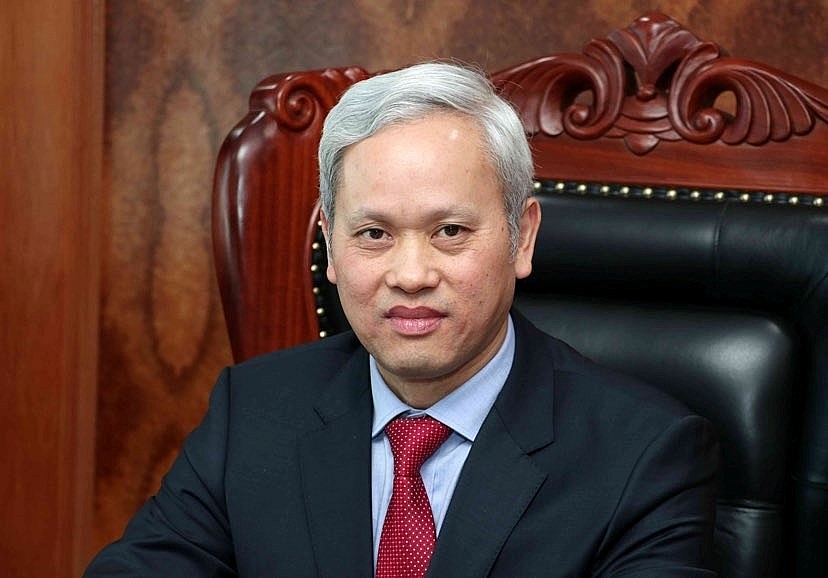INTERNATIONAL INVESTMENT
AND PORTAL
 Nguyen Bich Lam, former director-general of the General Statistics Office
Nguyen Bich Lam, former director-general of the General Statistics Office
In the first months of the year, the economy has been growing well with 5 per cent of GDP growth in the first quarter – higher than the performance in the same period of the previous two years – while the consumer price index (CPI) in the first four months rose by only 2.1 per cent on-year.
There are some factors affecting the increase in CPI, including the rise of nearly 48.9 per cent on-year of gasoline prices, contributing 1.76 percentage points to the average inflation of 2.1 per cent in the first four months.
Domestic gas prices fluctuated in accordance with the world market, with an average increase of 24.6 per cent, contributing 0.36 percentage points to the overall CPI increase.
However, some factors have controlled CPI so far this year. The average food price decreased by 0.94 per cent over the same period last year and the tuition fee exemption and reduction in some localities during and after the pandemic have helped the education group price index to fall by just over 3.9 per cent.
Besides these, the government has directed ministries, agencies, and localities to synchronously implement many solutions to stabilise prices and reduce the negative impacts on socioeconomic development.
Policies were issued in a timely manner, significantly reducing pressure on prices. These include cutting VAT from 10 to 8 per cent, reducing the amount of 37 other fees and charges, and a 50 per cent reduction of environmental protection tax on gasoline.
For the next 18 months, there are three main factors that will cause inflationary pressure.
Of these, supply chain inflation is the main one. Vietnam's economy is opening, and production depends on imported raw materials – making up 37 per cent of the total cost of materials. This rate in the manufacturing and processing industry – which plays a driving role in the economy’s growth – is almost 51 per cent.
The prices of raw materials are increasing, causing double the rise in goods and services on the market. So the rise in the country’s import value is predictable, because the largest trade partners of Vietnam, including the US, the EU, and South Korea, are struggling with high inflation.
Aggregate demand spikes amid supply chain disruptions will also have an effect. The socioeconomic recovery and development programme, at $15.2 billion, and the bailout in 2021 are penetrating all areas of the economy and causing a sudden increase in aggregate demand. The sharp increase in consumer demand for goods and services after the pandemic puts significant pressure on inflation.
The International Monetary Fund said that Vietnam's inflation this year will increase by 3.9 per cent, very close to the target of 4 per cent. Standard Chartered Bank predicted that it will exceed the 4 per cent target set by the National Assembly, and could rise to 5.5 per cent in 2023. In the view of BIDV Securities, it will be around 4.5-5.1 per cent.
Based on the impact factors above, Lam estimates that Vietnam's inflation will rise by 4-4.5 per cent in the coming time.
With the delay of the socioeconomic development and recovery programme, inflation in 2023 will be about 5-5.5 per cent – still high compared to the target inflation of economies that are important partners of Vietnam. Inflation in the whole period from 2021 to 2025 will be around 4 per cent, reaching the set target.
In order to control inflation, the government should promptly remove obstacles in mechanisms, policies, and administrative procedures and the business community needs to diversify supply sources.
The Ministry of Industry and Trade and the Ministry of Finance need to be transparent and simplify the trade process. They must encourage information sharing on trade and prices, promote domestic competition in logistics, wholesale, and retail trade, and retain the competitiveness and market share of Vietnamese goods around the world.
Moreover, we should strengthen inspection and examination, and resolutely handle any speculation, hoarding, or manipulative pricing. For items that are in short supply in the long term, it is necessary to have preferential policies, encourage investment in the production of these items, and self-supply raw materials to increase economic self-reliance.
Additionally, the State Bank of Vietnam and the Ministry of Finance should closely coordinate to carry out monetary and fiscal policies, use policies reasonably, and promote growth because credit support and lowering lending interest rates will lead to an increase in inflation and risks to the banking system.



















